Open Source Project Maintenance 2025
Every October, I do a maintenance pass on all my projects. At a minimum, that involves dropping support for whatever Python version is no longer supported and adding support for the most recently released Python version. While doing that, I go through the issue tracker, answer questions, and fix whatever I can fix. Then I release new versions. Then I think about which projects I should deprecate and figure out a deprecation plan for them.
This post covers the 2025 round.
TL;DR
sphinx-js -- transferred to pyodide organization
crashstats-tools and siggen -- transferred to the Mozilla crash ingestion team, which I'm no longer on
paul-mclendahand -- deprecated and archived
pip-stale -- deprecated and archived
everett -- released v3.5.0, then deprecated and archived
fillmore -- released v2.2.0, then deprecated and archived
kent -- released v2.2.0
markus -- released v5.2.0
bleach -- released v6.3.0
Prior to the October maintenance pass
Over the course of 2025, I deprecated or transferred some of the libraries I owned. Some of them because my role at Mozilla changed dramatically and some of them because it was time.
sphinx-js (which I "owned" for a short time) was transferred to the pyodide project.
paul-mclendahand was deprecated and archived at the tail end of 2024. I don't think I mentioned that. I don't think there were many users other than myself.
crashstats-tools was transferred to the Mozilla team that now owns the crash ingestion pipeline project.
siggen was transferred to the Mozilla team that now owns the crash ingestion pipeline project.
pip-stale was deprecated and archived; I never actually released this, but I wrote and used it until I switched everything to a uv based workflow.
rob-bugson was deprecated.
I started most of those projects, the exception being sphinx-js, which I inherited. I will miss working on them. I wish them well.
That leaves Everett, Fillmore, Kent, Markus, and Bleach.
Everett
I started Everett in August 2016 because I needed a configuration library that met the requirements for the crash ingestion system I was maintaining so that I could deprecate configman. I wanted a library that supported autodocumentation and facilitated easier testing. Everett was a good project. Over 9 years, I did 22 releases.
Recently, I became aware of pydantic-settings and as I looked over the documentation, it seemed likely that it did the bulk of what Everett does, minus the autodocumentation and convenient testing harness. In May 2025, I was moved to a different project at Mozilla and no longer use Everett.
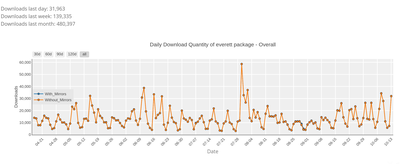
Everett downloads in 2025-04-21 through 2025-10-13. 480k / month. (pypistats.org)
Given that, I decided it made sense to deprecate it.
I wrote up my thoughts in this comment which includes experimentation with converting Everett-using code to pydantic-settings-using code. I released Everett v3.5.0 and deprecated it.
Fillmore
I started Fillmore in June 2022 because we were moving from an in-house managed instance of Sentry to a Sentry (the company) managed Sentry (the service) and the crash ingestion system I worked on had pretty strict data policies because errors sent to Sentry could contain sensitive data from users' crash reports.
In order to make this problem quantifiable (i.e., exactly what gets sent to Sentry?, does it change over time as I update the sentry-sdk library?, how do I know my filtering code is working?), I wrote Fillmore, which allowed me to:
centralize a very specific, very paranoid Sentry configuration which I could use and maintain across multiple projects
establish a framework to write scrubbers, taking into account the case where scrubbers throw an error, making sure that both errors make it to Sentry and it doesn't fail invisibly
write tests that guaranteed errors that follow sensitive paths in crash ingestion code didn't contain sensitive data
It was a good project. It allowed me to transition crash ingestion services to the Sentry (the company) managed Sentry (the service) while meeting the strict requirements of crash ingestion data policies. I did 11 releases.
Since I wrote Fillmore, Sentry (the company) focused on improving their sensitive-data story. The default configuration and event payload are better documented. In May 2025, I was moved to a different project at Mozilla and no longer use Fillmore. Fillmore wasn't really used by anyone else.
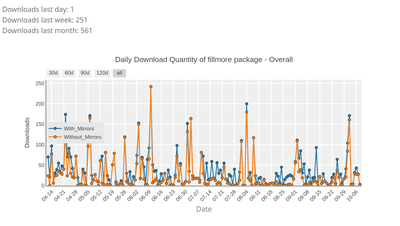
Fillmore downloads in 2025-04-14 through 2025-10-06. 561 / month. (pypistats.org)
Given that, I decided it made sense to deprecate it.
I wrote up my thoughts in this comment, I released Fillmore v2.2.0, and deprecated the project.
Kent
I started Kent in June 2022 when I was working on Fillmore. I needed a service that I could run in a local development environment on my laptop to capture Sentry sentry-sdk request payloads and then display them in a way I could debug Fillmore issues. Eventually, Kent grew a better API that allows people to use it in test environments to test Sentry sentry-sdk integration.
Kent is missing support for some key Sentry functionality, like spans and some of the other observability features. Kent development has slowed way down and Kent isn't really in use.
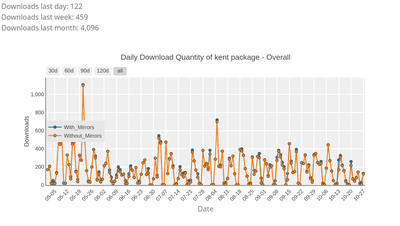
Kent downloads in 2025-05-05 through 2025-10-27. 4k / month. (pypistats.org)
I think Kent is not long for this world, but I decided to continue maintaining and supporting it for now.
I released Kent v2.2.0.
Markus
I started Markus in April 2017. We had StatsD code all over the place across multiple projects and it was inconsistent. There was no way to validate that metrics get generated correctly in tests and there was no way to determine what metrics were emitted for a project. Markus fixed a lot of those problems. Further, the way it was structured made adding metrics to code much easier because it mimicked the Python logging module and decoupled the metrics client from the metrics backends.
Markus is StatsD-centric. That was helpful years ago, but now we're moving to Prometheus and OpenTelemetry. Markus' API has the wrong shape for bolting on Prometheus or OpenTelemetry support. I would need to write a new library. Markus is used by multiple services at Mozilla, but not well used outside of Mozilla.
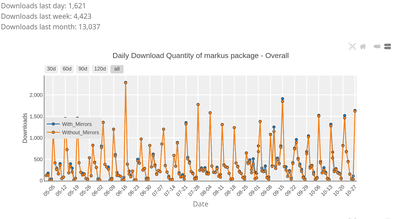
Markus downloads in 2025-05-05 through 2025-10-27. 13k / month. (pypistats.org)
I think Markus' days are numbered, but I decided to continue maintaining and supporting Markus for now.
I released Markus v5.2.0.
Bleach
James Socol started Bleach in February 2010. I took over Bleach in May 2016. I took a hiatus from February 2020 through April 2022, where I helped with Bleach, but Greg Guthe was the primary maintainer. In April 2022, I took over maintenance again and have been maintaining it ever since. When Bleach first started, it filled a critical void for sanitizing user-generated content for HTML contexts. It was a critical security library for Mozilla services like MDN, SUMO, Input, Addons, and others. It was used in readme-renderer, which was used in PyPI and a variety of other Python projects and services.
Bleach sits on top of the html5lib library and depends upon that library for the HTML parser. I acted as a temporary maintainer for html5lib to push the project over the 1.0.0 hump. Since then, it has largely been inactive. It hasn't had a release since June 2020. Bleach vendors this library and we apply several patches to it to fix issues in Bleach, but this is not a tenable situation. I talk about this in my post about Bleach 6.0.0 release and deprecation from January 2023. Nothing has changed since then.
I was hoping the HTML Sanitizer API would be further along by now. I think that model is more correct and safer than using Bleach.
Bleach is still in heavy use.
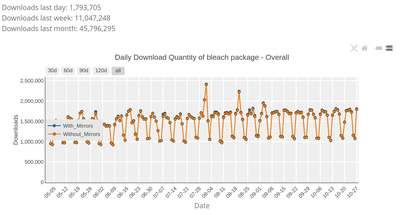
Bleach downloads in 2025-05-05 through 2025-10-27. 45m / month. (pypistats.org)
Bleach is deprecated, but I'll continue to minimally maintain Bleach for now. I released Bleach v6.3.0.
Conclusion
I finished up my maintenance pass and I whittled down the number of libraries I'm maintaining to three.